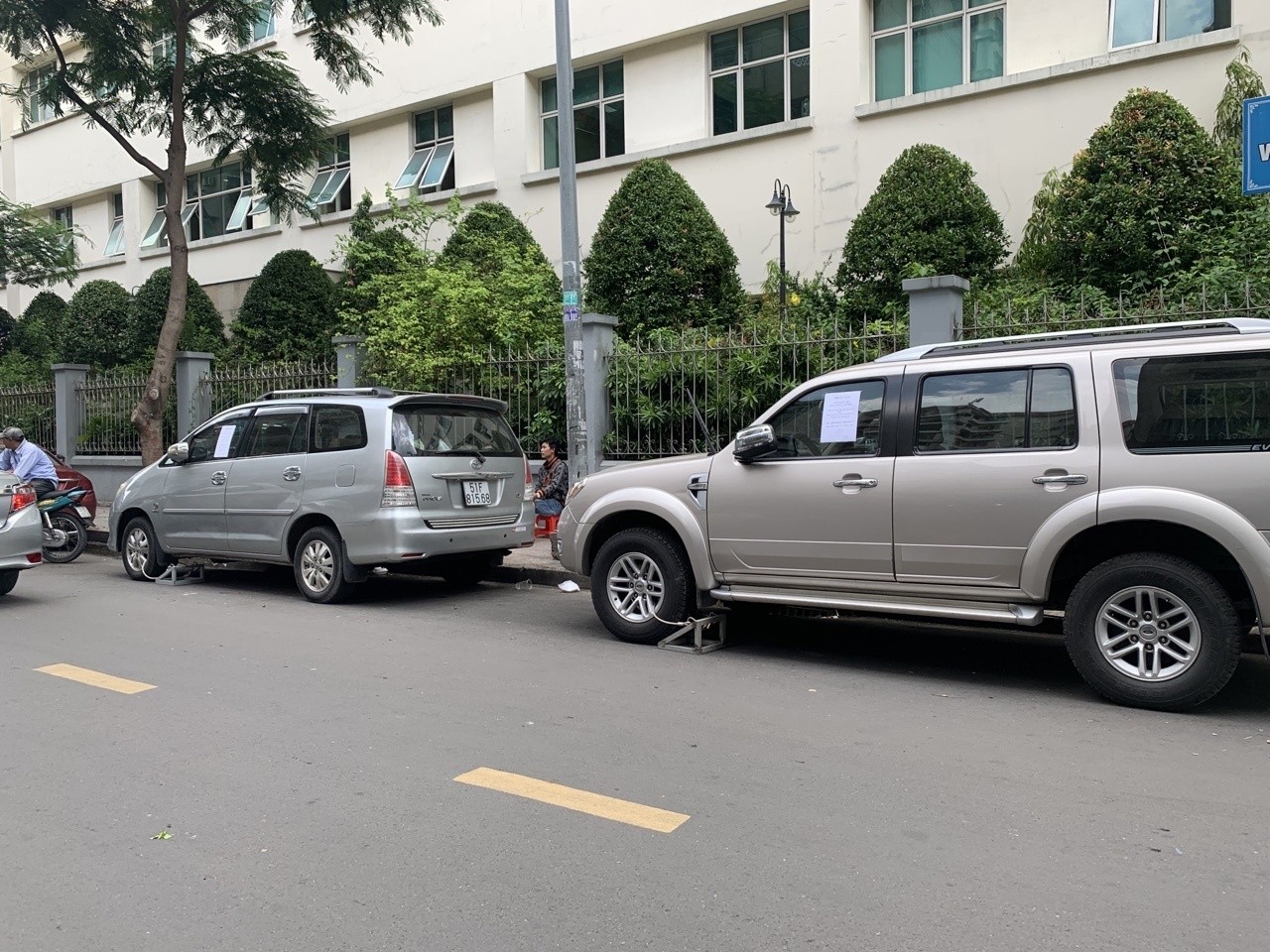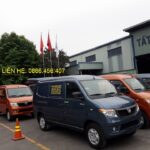Currently, parking issues, especially involving trucks, in urban areas are becoming increasingly complex and controversial. The lack of clarity in current mechanisms, policies, and laws, coupled with the unprofessionalism of enforcement forces in urban areas, has led to unnecessary conflicts between residents, visitors, and management forces. This situation not only causes resentment in the community but also affects urban order and traffic safety.
Conflicts over illegal truck parking in urban areas are no longer uncommon. The reasons stem from various aspects, including the low legal compliance awareness of some citizens, inadequacies in legal regulations, and different interpretations of the authority to handle violations by urban security forces.
Several factors contribute to this situation, including:
- Limited awareness of traffic laws: Many truck drivers are still arbitrary in parking, including on roads, sidewalks, or in urban areas, obstructing traffic and affecting the common life of residents.
- Ambiguity in the demarcation of management areas: Not all internal road areas in urban areas are under the management of security forces. Some areas, after infrastructure completion, have been handed over to the State for management. In this case, urban security forces do not have the authority to handle parking violations, which falls under the jurisdiction of competent authorities according to the Law on Handling Administrative Violations and the Law on Road Traffic.
No Specific Regulations on Truck Parking in Urban Areas
Clearly defining which areas in urban areas are for common use and which are under state management is not always easy. In addition, the management regulations of each urban area may vary, leading to different understandings and applications of laws. This is particularly complex when considering truck parking, which requires large sizes and special parking spaces.
The Law on Housing 2014 clearly stipulates the common and private use areas in apartment buildings. Clause 2, Article 100 of the Law on Housing 2014 defines: “Internal roads belong to the common ownership of the apartment building,” including the external technical infrastructure system connected to that apartment building.
However, the Law on Housing does not have specific regulations on the common use area in new urban areas, especially for trucks. Many people mistakenly believe that the regulations for apartment buildings can be applied to urban areas in general, but this is not entirely accurate. In fact, some new urban areas are mainly villas, townhouses, shophouses, low-rise houses, and do not have apartments. Applying the regulations on apartment buildings to these urban areas becomes inappropriate and causes many disputes.
Moreover, whether the regulations on apartment building management apply to low-rise urban areas, or which regulations apply to mixed high-rise and low-rise urban areas, remains a matter of debate. The main reason is that the legal system on new urban areas and low-rise housing is not complete and timely, leading to many different understandings and applications in practice.
For apartment buildings, the Building Management Board has the right to manage on behalf of the owners according to the Regulations on Apartment Building Management (Circular 02/2016/TT-BXD of the Ministry of Construction). But for new urban areas, management is dispersed in many different and incomplete legal documents, making it difficult to manage, especially the issue of truck parking.
Previously, Decree 02/2006/ND-CP and the Regulations on New Urban Areas attached to this decree were applied, but they did not clearly stipulate the responsibilities and authority of security forces, urban area managers, or the handling of truck parking violations. These regulations mainly focused on “managing and implementing new urban area projects, including the project formation process, investment construction implementation, exploitation, and transfer.”
Decree 15/2021/ND-CP dated March 3, 2021, of the Government provides more detailed regulations on the management of urban area investment construction projects, clearly distinguishing between urban area projects with housing and without housing. However, these regulations are still not sufficient to completely solve the problems arising in practice, especially the issue of truck parking in urban areas.
In general, the system of legal documents on construction and housing has undergone many amendments and supplements, but the regulations on the management of new urban areas still have many unclear contents. This leads to different understandings in applying the regulations on the management of apartment buildings or urban areas in mixed areas, making it difficult to manage truck parking and other vehicles.
Locking Truck Wheels: Infringement of Property Rights
In many projects, after completion, internal roads and the traffic system around the urban area are handed over to the State for management. For these areas, the management and handling of truck parking violations must comply with the Law on Road Traffic and legal documents related to public property. The competent authority will handle violations according to the Law on Handling Administrative Violations and the Law on Road Traffic.
If the urban security force arbitrarily handles truck parking violations on the area managed by the State, it is an act beyond its authority. In particular, actions such as locking wheels, sealing, and towing trucks to other places clearly infringe on the property rights of citizens and may cause material damage to vehicle owners.
 Truck parked in an urban area: A thorny legal and practical issue.
Truck parked in an urban area: A thorny legal and practical issue.
Only within the common use area, under the management of the Urban Area Management Board or the Apartment Building Management Board, does the security force have the right to perform its duties according to the management regulations of the urban area or apartment building. However, it should be emphasized that the regulations on apartment building or urban area management are self-management activities based on the consensus of the residential community. When the regulations are validly and legally established, the security force is responsible for implementing them.
Handling truck parking violations in urban areas is a matter of internal convention and agreement, not a legal sanction. The security force must not abuse its power to infringe on the property of residents or others. If a dispute arises, the parties have the right to request competent authorities to investigate, clarify, and handle the matter, or bring the case to court for resolution through civil proceedings.
Conflicts over parking and ensuring safety and order in urban areas and apartment buildings are becoming increasingly common. To solve this problem, it is necessary to improve the legal basis for better management of apartment buildings and urban areas. The management regulations of urban areas and apartment buildings need to have specific regulations, built on the basis of law and made public so that all people know and consciously implement them.
In urban areas and apartment buildings with land areas, works, or internal roads managed by the State, there should be clear guidance, instructions, and regulations. There should be functional forces to perform management tasks to ensure order, traffic safety, security, and avoid arising conflicts.
The act of “locking truck wheels” is becoming common in many urban areas, causing many controversies and conflicts. Locking wheels is not an administrative measure under legal regulations but a “spontaneous” measure that many urban areas apply to deter people from parking in the wrong places. However, this directly affects the lives, jobs, and even causes damage to the property of vehicle drivers. Especially with trucks, a means of livelihood, being locked wheels causes psychological stress and easily leads to conflict. The attitude and behavior between drivers and security forces are not always standard and peaceful, increasing the risk of conflict and loss of security.
Therefore, in the near future, the functional agencies need to complete the mechanisms, policies, and laws and have specific guidance to strengthen management in urban areas and apartment buildings. At the same time, there needs to be a mechanism to develop specific regulations and measures to ensure implementation. The selection, training, and professional development for security and self-management forces in urban areas and apartment buildings also need to be given attention to minimize unnecessary conflicts and disputes.
Lawyer DANG VAN CUONG
Hanoi Bar Association
Contributing to the draft Law on Land (amended): It is necessary to improve regulations on land dispute mediation
Bui Thi Thanh Loan

